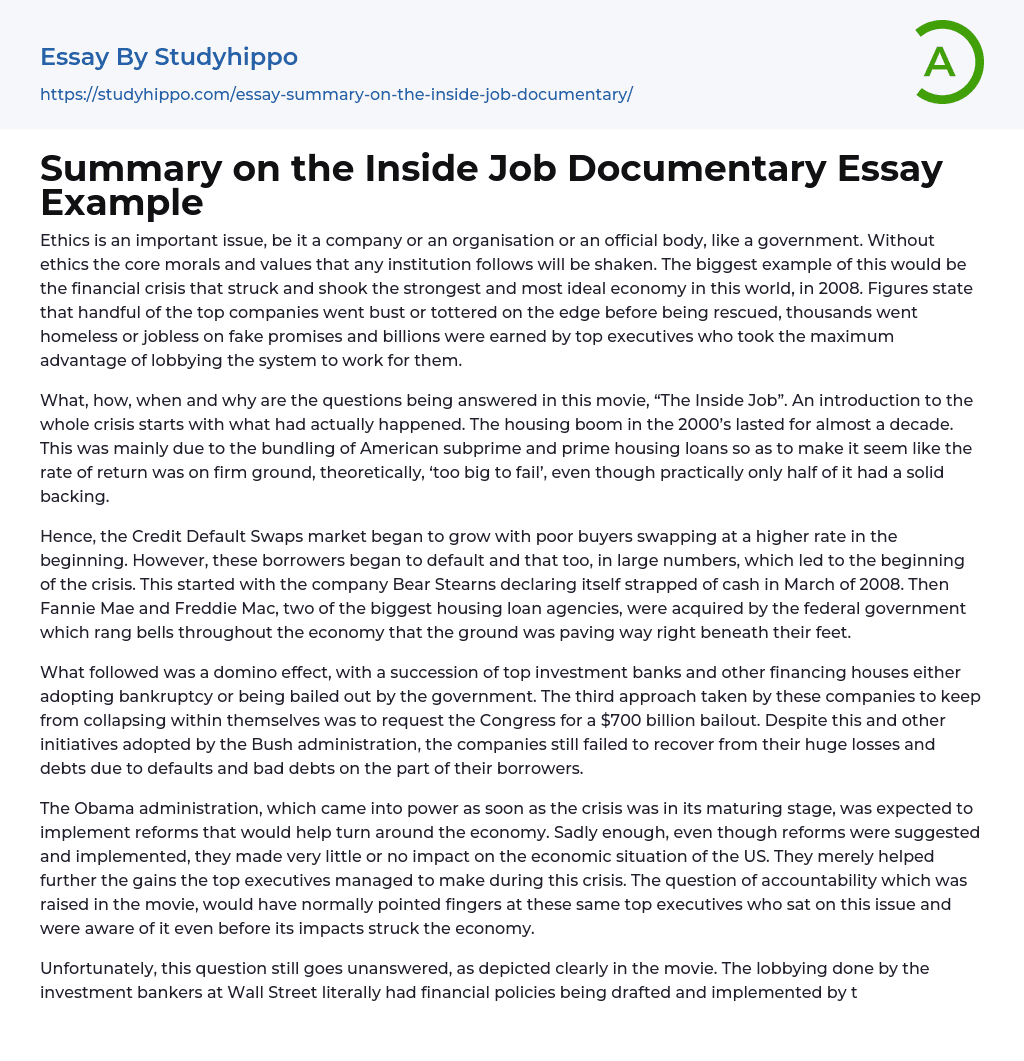Ethics is an important issue, be it a company or an organisation or an official body, like a government. Without ethics the core morals and values that any institution follows will be shaken. The biggest example of this would be the financial crisis that struck and shook the strongest and most ideal economy in this world, in 2008. Figures state that handful of the top companies went bust or tottered on the edge before being rescued, thousands went homeless or jobless on fake promises and billions were earned by top executives who took the maximum advantage of lobbying the system to work for them.
What, how, when and why are the questions being answered in this movie, “The Inside Job”. An introduction to the whole crisis starts with what had actually happe
...ned. The housing boom in the 2000’s lasted for almost a decade. This was mainly due to the bundling of American subprime and prime housing loans so as to make it seem like the rate of return was on firm ground, theoretically, ‘too big to fail’, even though practically only half of it had a solid backing.
Hence, the Credit Default Swaps market began to grow with poor buyers swapping at a higher rate in the beginning. However, these borrowers began to default and that too, in large numbers, which led to the beginning of the crisis. This started with the company Bear Stearns declaring itself strapped of cash in March of 2008. Then Fannie Mae and Freddie Mac, two of the biggest housing loan agencies, were acquired by the federal government which rang bells throughout the economy that the
ground was paving way right beneath their feet.
What followed was a domino effect, with a succession of top investment banks and other financing houses either adopting bankruptcy or being bailed out by the government. The third approach taken by these companies to keep from collapsing within themselves was to request the Congress for a $700 billion bailout. Despite this and other initiatives adopted by the Bush administration, the companies still failed to recover from their huge losses and debts due to defaults and bad debts on the part of their borrowers.
The Obama administration, which came into power as soon as the crisis was in its maturing stage, was expected to implement reforms that would help turn around the economy. Sadly enough, even though reforms were suggested and implemented, they made very little or no impact on the economic situation of the US. They merely helped further the gains the top executives managed to make during this crisis. The question of accountability which was raised in the movie, would have normally pointed fingers at these same top executives who sat on this issue and were aware of it even before its impacts struck the economy.
Unfortunately, this question still goes unanswered, as depicted clearly in the movie. The lobbying done by the investment bankers at Wall Street literally had financial policies being drafted and implemented by them. Figuratively speaking, they had Washington under their thumb, which is still the case today. Parallels can be drawn with our Indian situation with scam cropping up in every sector of the government and among private players, who try to follow the rules, but end
up following the money trail.
- Bank essays
- Banking essays
- Corporate Finance essays
- Credit Card essays
- Currency essays
- Debt essays
- Donation essays
- Enron Scandal essays
- Equity essays
- Financial Accounting essays
- Financial Crisis essays
- Financial News essays
- Financial Ratios essays
- Financial Services essays
- Forecasting essays
- Foreign Exchange Market essays
- Free Market essays
- Gold essays
- Investment essays
- Legacy essays
- Loan essays
- Market Segmentation essays
- Money essays
- Personal finance essays
- Purchasing essays
- Retirement essays
- Shareholder essays
- Stock Market essays
- Supply And Demand essays
- Venture Capital essays
- 12 Angry Men essays
- A beautiful mind essays
- A Separation essays
- Alfred Hitchcock essays
- American Beauty essays
- American Films essays
- Animation essays
- Avatar essays
- Blade Runner essays
- Bollywood essays
- Bond essays
- Bridge essays
- Cinema Of The United States essays
- Comedies essays
- David essays
- Dead Poets Society essays
- Do The Right Thing essays
- Documentary essays
- English-Language Films essays
- Erin Brockovich essays




